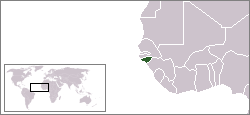共享资源:各地著作权法规/几内亚比绍
|
著作权法规: 几内亚比绍 快捷方式: COM:几内亚比绍 | |
 | |
 | |
| 保护期限 | |
|---|---|
| 标准 | 作者逝世+50年 |
| 匿名 | 出版 + 50年 |
| 集体作品 | 出版 + 50年 |
| 死后出版 | 逝世+50年 |
| 其他 | |
| 全景自由 | For 3D objects |
| 截至年底 | 是 |
| 一般授权条款标签 | {{PD-Guinea-Bissau}} |
| 协议 | |
| 伯尔尼公约 | 1991年7月22日 |
| 班吉协定 | 1998年7月8日 |
| 世界贸易组织成员 | 1988年6月28日 |
| 乌拉圭回合协议法案回溯日期* | 1996年1月1日 |
| *只要一个作品在美国可以受版权保护,在1928年12月31日之后发表,并在来源国的URAA日期受版权保护,那么它通常会在美国受保护。 | |
This page provides an overview of copyright rules of Guinea-Bissau relevant to uploading works into Wikimedia Commons. Note that any work originating in Guinea-Bissau must be in the public domain, or available under a free license, in both Guinea-Bissau and the United States before it can be uploaded to Wikimedia Commons. If there is any doubt about the copyright status of a work from Guinea-Bissau, refer to the relevant laws for clarification.
背景
The present Guinea-Bissau was colonized as Portuguese Guinea in the 19th century. It declared independence in 1973, and this was fully recognized in 1974. The name of the capital, Bissau, is added to the name to avoid confusion with Guinea (formerly French Guinea).
Guinea-Bissau has been a member of the Berne Convention since 22 July 1991, the World Trade Organization since 31 May 1995 and the Bangui Agreement since 8 July 1998.[1]
As of 2018 the World Intellectual Property Organization (WIPO), an agency of the United Nations, listed the Portuguese Copyright Code (approved by Decree-Law No. 46.980 of March 28, 1972) as the main copyright law enacted by the legislature of Guinea-Bissau.[1] WIPO holds the text of this law in their WIPO Lex database.[2] The decree-law of 1972 approved and reproduced Law No. 46980 of April 27, 1966, issued by the colonial government of Portuguese Guinea.[2]
As of 2013 there were still no signs of any replacement of the colonial copyright Law No. 46,980 of April 27, 1966.[3]
一般规则
Under the 1972 version of the Copyright Code,
- The duration of protection shall cover the life of the author and 50 years following his death.[46.980/1972 Article 25]
- Copyright in a work of joint authorship shall last for the lifetime of its authors and shall continue for 50 years after the death of the last surviving coauthor.[46.980/1972 Article 30]
- Copyright for a collective work, as a whole, shall be 50 years following the first publication or disclosure of the work, or of each volume, issue or installment of the work if these different parts are published separately at different times.[46.980/1972 Article 31, 36]
- If, however, the collective work belongs to an individual operator, copyright shall last for the lifetime of the author and for another 50 years following his death.[46.980/1972 Article 31]
- The duration of copyright of the individual contribution of each coauthor in works of joint authorship or collective works is the life of the author and 50 years following his death.[46.980/1972 Article 32]
- The duration of protection of posthumous works shall cease 50 years after the death of the author.[46.980/1972 Article 33]
- The duration of protection of anonymous, cryptic or pseudonymous works shall be 50 years following disclosure or publication.[46.980/1972 Article 34]
The periods of protection shall only commence on 1 January of the year following that in which the death or other events referred to in these Articles occurred.[46.980/1972 Article 35]
货币
参见:共享资源:货币
![]() Unsure West African CFA franc used in Guinea-Bissau has close ties to France. French Cour de Cassation ruled in 2002 that franc is not covered by Copyright Law[4], but it is not known if it also applies to West African CFA franc.
Unsure West African CFA franc used in Guinea-Bissau has close ties to France. French Cour de Cassation ruled in 2002 that franc is not covered by Copyright Law[4], but it is not known if it also applies to West African CFA franc.
全景自由
参见:共享资源:全景自由
![]() 可以: For 3D objects. The applicable law still is the colonial copyright law, which says "The reproduction and publication by the press, cinema, television or any other mean, of the image of works of architecture or any other kind of plastic arts already divulged by the author is free".[46.980/1972 Article 152]
可以: For 3D objects. The applicable law still is the colonial copyright law, which says "The reproduction and publication by the press, cinema, television or any other mean, of the image of works of architecture or any other kind of plastic arts already divulged by the author is free".[46.980/1972 Article 152]
引用
- ↑ a b Guinea-Bissau Copyright and Related Rights (Neighboring Rights). WIPO: World Intellectual Property Organization (2018). Retrieved on 2018-11-04.
- ↑ a b Copyright Code (approved by Decree-Law No. 46.980 of March 28, 1972). Guinea-Bissau (1972). Retrieved on 2018-11-04.
- ↑ Akester, Patrícia (2013) Direito de Autor em Portugal, nos PALOP, na União Europeia e nos Tratados Internacionais, p. 234
- ↑ [1]